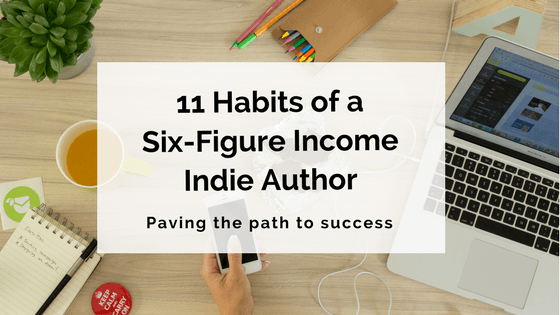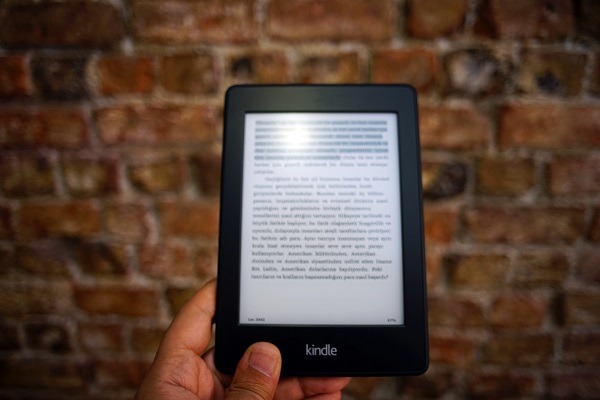For as long as I can remember, I’ve been told that authors don’t make any money. That a degree in creative writing was a fast-track to unemployment, and that I could never expect to earn a liveable income from books.
I’m proud to say, I’ve proven those people wrong. Now, I want to share my experiences with you.

Below, you’ll find 11 habits myself and other successful authors employ in order to support ourselves with our writing.
So without further ado, let’s dive in.
1. Have a quality product
While it seems like stating the obvious, you’d be surprised at how many indie authors think the solution to success is pumping out as many books as possible – quantity over quality.
However, if you look at the authors who stick in the charts, who generate a liveable income from their books, you’ll notice that everything about the product they offer sings quality.
I’m talking about cover-to-cover outstanding quality, in each of the following elements:
- Cover design (front, spine and back)
- Interior design and formatting
- Writing
- Editing
- Proofreading
- Front and back matter
- Blurb
- Imprint and logo
Each of these elements needs to be carried out with care and attention to detail. Your book is a complete packaged product and should look as such in every way possible.

2. Treat books as business
While writing is an art form, publishing is a business, and the most successful authors treat it as such. As much effort needs to go into your book production and marketing as it does your actual writing.
And it doesn’t stop there. Any good business has a business plan, and you need to have the same when it comes to your books.
You need a publishing and production schedule, a marketing calendar, a budget and expense sheets, to name a few key ingredients.
Successful authors are constantly tracking and analysing data: what books sold, where they sold, through which channels, what sales tactics provided the best ROI (return on investment), etc.
Product splintering is another business aspect to consider. This is where an author creates multiple products from a single product, e.g. ebook, paperback, audiobook, book swag/merchandise, creating reader magnets from first chapters, writing prequel stories, bundling three books into a new product…
In essence, an author needs to view publishing on the big scale.

3. Know your audience and categories
One of the mistakes I see made by traditional publishers and indie authors alike is flinging their books out into the void and expecting them to sell.
The key to successful publishing is knowing your target market, and choosing the right categories and genre/subgenre for your titles.
It’s more complicated than writing fantasy for young adults. You need to dig deeper. What fantasy subgenres does your novel fit into? What niche categories could it be classed under?
For example, look at the categories Heart of Mist is in…
- Kindle Store > Kindle eBooks > Teen & Young Adult > Literature & Fiction > Politics & Government
- Kindle Store > Kindle eBooks > Teen & Young Adult > Mysteries & Thrillers > Fantasy & Supernatural
- Kindle Store > Kindle eBooks > Teen & Young Adult > Science Fiction & Fantasy > Fantasy > Epic
Knowing where to place your book, and knowing your audience, is critical for marketing.
Once you know these things, and know them well, you’ll be able to target the most appropriate reviewers and book marketing services.

4. Publish a series if you can
If you check out the bestselling indie authors, you’ll notice they have at least one thing in common: they mostly publish series.
There’s a reason for that.
There are numerous benefits to writing a series as opposed to a standalone novel:
- Series boost backlist sales
- Series help build an audience by making readers familiar with an author brand
- Series help to provide you with a clear structure and goals to work towards in your publishing career
- A well-developed series can give you opportunities for expanding into spin-offs etc.
If you build a readership with a novel, the best thing you can possibly do is continue that story or that world in another book, and another.
In the age of binge-watching, people are devouring books as well – there’s something addictive about a really well-written series, and the most successful authors are taking full advantage of that.

5. Price competitively
I’ve talked in depth about pricing in a previous post, but the importance of competitive pricing must be stressed here as well.
The beauty of indie publishing is that the pricing of your book is entirely in your control. You can change it as often as you like; you can experiment with what works and what looks good alongside competing titles; you can change it to run special deals.
The most successful indie authors are constantly assessing their pricing. Is it competitive enough? Is if fair? Does it enable you to partake in particular services?
These are the things six-figure income authors are assessing regularly.

6. Build a mailing list
There has been so much talk lately about over-saturating people’s inboxes, and how email lists aren’t as valuable as they once were…
The thing is, if you treat your email list and your email marketing right, this is simply not true. An email list can be one of the most valuable assets an author has.
If you build a list that’s relevant to your niche, and treat your subscribers with consideration and respect, it can help you not only stay connected to readers, but also sell more books in the long run.

7. Prioritise your ebooks
I know we all have this romantic notion about being published in print, and that’s fine – more than fine, even. I’m not saying you shouldn’t do print books.
However, what I am saying is that as an indie author, your marketing and promotion priorities (where you spend your advertising and marketing budget) should be with your ebooks.
Ebooks have a lower production and logistic cost to you. There’s no printing or shipping involved whatsoever, which means that your ROI is much higher.
For example, if an author sells a paperback copy of their book for $25, keep in mind the costs that come out of that $25:
- $7 per copy to print
- $10 per copy to ship
- If you’re selling via bookstores, they take 40% commission from the RRP
- Some bookstores require that you go through a distributor, which will also take a cut
These figures will vary from book to book and country to country. However, the point remains the same: print books have a high production cost.
You also need to factor in the time and energy it takes if you’re doing your own postage and handling, invoicing, warehousing, e-store management and customer service.
Ebooks provide no such complications or extensive management.
Generally, an ebook file is uploaded to an e-retailer like Amazon, and they distribute the book for you as people purchase it.
While the RRP of the product is usually lower than a paperback, and the retailer still takes a cut, ebooks have proven to be far more profitable than their print counterparts.
For this reason, it makes business sense to prioritise this format when paying for advertising and marketing services. You’re far more likely to get a higher ROI than you would if you poured the same money into advertising your print books.

8. Experiment with publishing exclusively AND widely
In case you’re not familiar with this terminology, here’s a quick explanation:
Exclusive: Publishing and distributing through one single platform. Usually this is in reference to Amazon. For example, Heart of Mist is currently exclusively available on Amazon (not iBooks, Nook, Kobo etc.).
Wide: Publishing and distributing across a variety of platforms, such as: Amazon, iBooks, Nook etc.
There are benefits to both of these distribution options.
For example, being exclusive to Amazon allows you to run various promotions such as Kindle Countdown Deals and free days.
Publishing widely, on the other hand, means that your income stream is diversified (you’re not putting all your eggs in one basket), and you’ll be able to reach readers who don’t have Kindles.
Best practice is to experiment with what works for each individual book, and continue to experiment long after the book’s release.
You may decide to distribute exclusively through Amazon for the first six months, then after the initial release period, go wide.
The point is that the authors who are doing well are constantly analysing where their sales are coming from, and how to utilise the platforms available to them.

9. Stay immersed in the industry
Like anyone who’s good at their job, an author should always be aware of the ongoing changes and developments in their industry. This goes for the indie and traditional publishing industries alike.
You should always stay on top of the latest news, bestseller charts, new tools and services. This will mean that you’re never caught off-guard when there are changes to platforms and services you use.
Most importantly, you’ll know how these will affect your sales, and how you can either take advantage of developments, or adapt your current tactics to avoid a dip.
Staying immersed in the industry also means that you can connect with like-minded people and potentially learn from them.

10. Be smart about purchasing services
If you’re doing self-publishing right, you’ll have a budget dedicated entirely to book promotion. It doesn’t matter how big or small your marketing budget is; what matters is that you’re smart with how you use it.
At the beginning, it’s easy to get overwhelmed by all the tools and services available online for indies. It can be tempting to throw money at something and cross your fingers that it works.
It usually doesn’t.
One of the most common habits of successful authors is that they do their research when it comes to paid marketing services.
They ask questions like:
- What does this service entail?
- Does it have good testimonials from other authors?
- Does it suit my genre and niche?
- What sort of ROI can I expect?
- Can I afford it?
- Does my book need to be at a certain price point in order to partake in this service?
- If I change my price point, will it affect my existing royalties and income? How? Will it be worth it?
And that’s just the tip of the iceberg.
If you’re going to be investing in paid promotion or marketing tools, you need to make sure you’re not left in the red.

11. Avoid burnout
The problem with being a successful author is that it’s a lot of hard work. Seriously.
Most authors I know in this space put in over 12+ hours of work every day. We rarely take holidays, we feel guilty when we’re not working, and we’re in a constant state of anxiety over our sales and income.
All of these things can lead to burnout – a writer’s worst nightmare, particularly as deadlines loom.
While indie authors do need to work hard to make a living from their writing, it’s so important to remember to take care of yourself as well.
As an indie author, it’s easy to feel like you can always be doing more – but you need to realise you’re not doing yourself any favours by pushing yourself too far.
Personal and creative burnout can be hard to recover from. If you work yourself to the point of burning out, you’ll only end up setting yourself back in the long run.
So what can you do to avoid getting to this stage?
Take a breath. Take a step back. Take a break (yes, an actual break!). Practise self-care. Prioritise both your physical and mental health. Talk to friends, family and other writers.
Whenever you feel yourself coming close to breaking point, do whatever you need to do to get back on track again and restore a healthy balance to your life. It’s the only way to maintain a sustainable, long-term career.

***
So there you have it! 11 Habits of a Six-Figure Income Indie Author.
What are some of your habits that have led to publishing success? Don’t forget to share your experiences in the comments below!
One response to “11 Habits of a Six-Figure Income Indie Author”
I love every word of this! Yes, yes, all of this, a million times this!